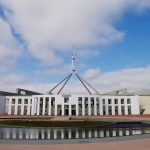The Real Laws That Threaten Public Debate

If you read the papers, you might think section 18C of the Racial Discrimination Act is the biggest threat to public debate in Australia.
For almost two years, the issue has featured prominently on front pages of major newspapers around the country – with claims the law is being used to stifle commentators, cartoonists, and politicians alike.
In the lead-up to the recent parliamentary debate on the laws, Attorney-General George Brandis lamented living in a country:
“… where a political cartoonist gets persecuted for publishing a provocative but important political cartoon; where a newspaper columnist gets a finding against him against him for writing a provocative article…”
“We want a robust free country in which people within reasonable bounds can have free exchange of ideas and opinions.”
The irony, of course, is that during his term as Attorney-General, Brandis has overseen the passage of several laws which have a far greater impact on public discourse.
Sadly for Brandis, his government’s amend 18C has proved unsuccessful. However, here are several other laws to which he might turn his newfound enthusiasm for free speech.
Prison sentences for reporting on ASIO operations
Passed in 2014, section 35P of the ASIO Act allows for journalists to be imprisoned for five or 10 years for reporting on “special intelligence operations”.
So what exactly is a “special intelligence operation”? According to the Act, it means anything ‘that is carried out for a purpose relevant to the performance of one or more special intelligence functions’ – a broad definition that encompasses much of the organisation’s core functions.
Section 35P grants ASIO officers special immunity in situations where they commit criminal offences such as assaults or even sexual offences during special intelligence operations.
With approval from Brandis, ASIO officers can commit heinous offences with the knowledge they won’t be held to account by the civil or criminal courts.
And thanks to section 35P, journalists can’t hold them to account either, even if their reporting reveals criminal conduct outside the operation’s scope.
In a submission critical of the amendments, the Law Council of Australia wrote they were:
“concerned that the provisions will interfere with freedom of speech and prevent public discussion of important issues of public interest.”
Such issues could include botched ASIO training exercises, illegal surveillance of foreign governments, and details of harm done to innocent victims of anti-terrorism raids if committed today.
The government has already admitted approving at least one ‘special intelligence operation’, but thanks to 35P, details of what it is, and whether the public should have a right to know, is anybody’s guess.
Prison for receiving leaked official documents
Passed long before Brandis’ time in parliament, but made all the more relevant since his government’s metadata retention scheme came into effect, sections 79(5) and 79(6) of the Commonwealth Crimes Act makes it an offence for journalists to “receive” a leaked official document. Such materials include:
“… any sketch, plan, photograph, model, cipher, note, document, article or information… deemed to belong to the Commonwealth.”
Introduced during a period of wartime paranoia in 1914, the laws were initially designed to prevent State secrets falling into the wrong hands during World War 1.
The then-government’s fears ultimately proved to be unfounded, but the legislation remained in effect, outlasting successive governments and numerous legal reviews. The penalty for receiving such information has also stayed the same, and a journalist found guilty of receiving an unauthorised leak can face a prison term of six months to seven years.
It is feared the introduction of metadata laws – which can be used to trace sources to journalists – along with an increasing number of raids on government departments suspected of leaking, will put journalists at risk for receiving information about, let alone reporting on, government misconduct and corruption.
Just last year, police raided Parliament House in an attempt to track down the source of an embarrassing leak revealing the extent of cost-blowouts on the National Broadband Network, important but hardly a state secret.
And the Australian Federal Police has admitted investigating journalists suspected of receiving leaked official information, including the Guardian’s Paul Farrell, and reporters Michael Gordon and Greg Sheridan.
Prison for whistleblowers
Passed under Brandis, section 42 of the Australian Border Force Act makes it a criminal offence for any person working for the Department of Immigration and Border Protection to reveal human rights abuses in detention centres like Nauru and Manus Island.
The laws effectively act as a bar to informed public debate about what’s happening on Australia’s offshore detention network.
Despite this, numerous reports by international bodies have painted a horrifying portrait of human rights abuses, violence and suffering in the centres.
Last year saw both Amnesty International and the UNHCR call for the camps to be closed,
“Australia’s policy of exiling asylum seekers who arrive by boat is cruel in the extreme,” said Anna Neistat, senior director for research at Amnesty International, “few other countries go to such lengths to deliberately inflict suffering on people seeking safety and freedom.”
The operation of the centres has marred Australia’s reputation internationally, but the Border Force Act continues to prevent many Australians from being aware of this, or being able to receive information from the source.
The question of whether the centres would remain open if Australians had access to information about them is beyond the scope of this blog.
However, it’s clear that laws like these adversely impact on public debate and state accountability. Other than agents of the state and those in power, who really wants a system “where a newspaper columnist gets a finding against him for writing a provocative article?”
Indeed, there is an argument that laws which prevent journalists and concerned citizens from speaking out about government corruption and human rights abuses, and which allow law enforcement agents to commit heinous crimes against people with impunity, are more consistent with a totalitarian state than a liberal democracy.






